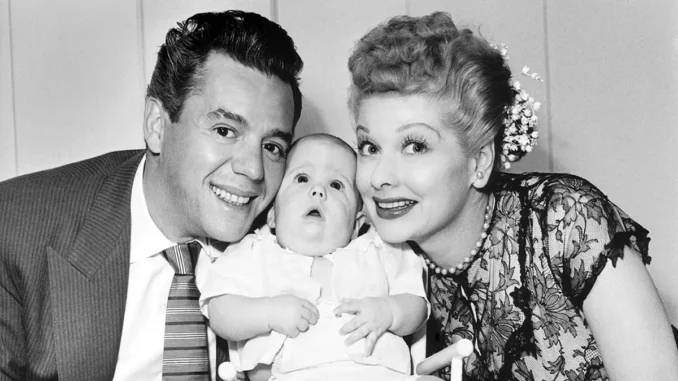
When I Love Lucy premiered in 1951, few could have predicted that it would revolutionize television forever. Yet, long before its first episode aired, the show faced fierce resistance from network executives — all because of one bold casting decision. At the heart of it was Lucille Ball’s determination to star opposite her real-life husband, Desi Arnaz, a Cuban-born bandleader whose presence challenged the conventions of postwar American television.
A Risky Proposal That Shook CBS
Lucille Ball had already proven herself as a successful radio actress on My Favorite Husband, and CBS wanted to adapt it for television with her as the star. But Ball had one non-negotiable demand — Desi Arnaz had to play her husband. The network balked at the idea, arguing that audiences wouldn’t accept an “all-American redhead” married to a Latin musician.
At the time, interracial and intercultural relationships were almost unseen on television, and CBS worried it would alienate viewers. But Lucille stood firm. “If Desi doesn’t play my husband, I won’t do the show,” she famously declared. Rather than give in, the couple decided to prove their chemistry directly to audiences — by taking their act on the road.
Their nationwide vaudeville tour, “I Love Lucy: The Stage Show,” became an instant hit, showcasing their natural charm and comedic rhythm as a married duo. The overwhelming response from audiences forced CBS to reconsider, and in 1951, the network reluctantly greenlit I Love Lucy — starring Ball and Arnaz as Lucy and Ricky Ricardo.
Breaking Boundaries Onscreen
From the moment the Ricardos appeared on television, viewers were captivated. The show’s portrayal of an interracial marriage was groundbreaking for its time. Ball’s genius for physical comedy paired perfectly with Arnaz’s musical charisma, creating a warm and authentic dynamic that transcended prejudice.
Yet the show’s casting wasn’t just socially daring — it also transformed the business of television production. Because Desi Arnaz wanted to keep the couple based in Los Angeles (rather than move to New York, where most TV shows were filmed live), he proposed filming the series on 35mm film using multiple cameras. This innovative setup allowed for higher-quality syndication — and effectively created the sitcom filming standard that still exists today.
Arnaz also co-founded Desilu Productions with Ball, making them one of the first husband-and-wife teams to run a major television studio. Their company later produced hits like Star Trek and Mission: Impossible, cementing their legacy far beyond I Love Lucy.

The Backlash and the Breakthrough
Despite its massive success, I Love Lucy didn’t escape controversy. Some advertisers were initially hesitant to support a show centered around a Cuban-American lead. Others questioned whether audiences would find Arnaz’s accent “too foreign.” But week after week, the Ricardos’ comedic misadventures drew millions of viewers, shattering ratings records and cultural barriers alike.
Behind the scenes, Lucille Ball faced constant pressure to balance her comedic instincts with the expectations of a conservative network. She fought to keep her husband in the spotlight and later pushed boundaries again when she became the first woman to run a major TV studio after buying out Arnaz’s share of Desilu in 1962.
By then, the woman who had once been told her marriage would never work on screen had become one of the most powerful figures in television history.
A Legacy That Redefined Television
The success of I Love Lucy not only normalized diverse relationships but also set the foundation for serialized sitcom storytelling. Its innovations — from the three-camera setup to live studio audiences — became industry standards. More importantly, it proved that audiences cared more about authenticity and laughter than about cultural conformity.
Lucille Ball and Desi Arnaz’s insistence on telling their own story, in their own way, changed what was possible for television. The show’s casting controversy, once viewed as a gamble, is now celebrated as a turning point in entertainment history — one that paved the way for greater representation and creative freedom across decades of TV to come.
More than seventy years later, I Love Lucy still feels revolutionary, not just because it made people laugh, but because it dared to be different — and proved that love, comedy, and courage could change television forever.